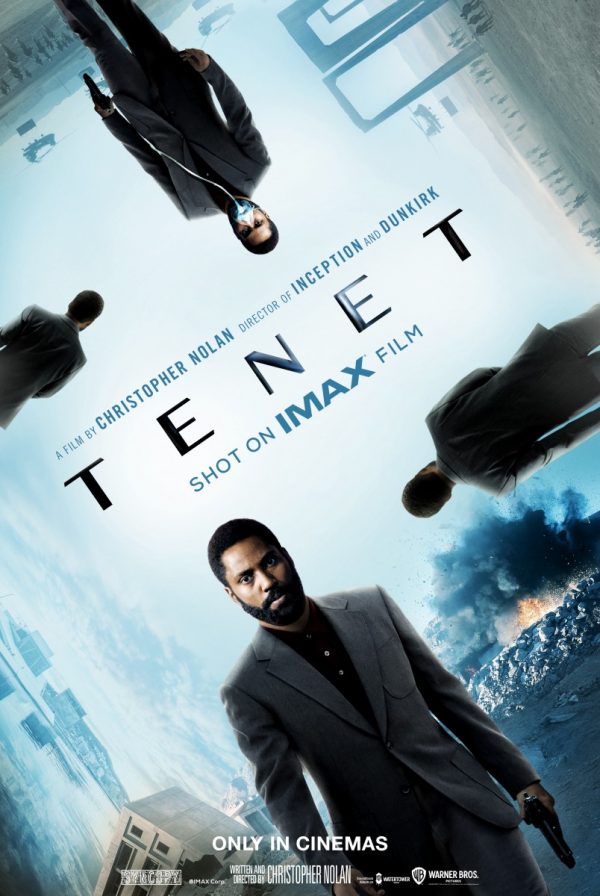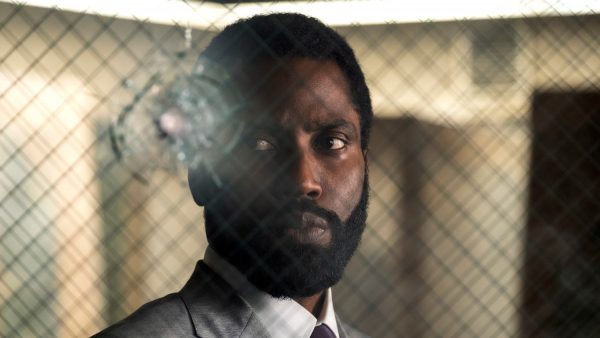Tenet, 2020.
Written and Directed by Christopher Nolan.
Starring John David Washington, Robert Pattinson, Elizabeth Debicki, Kenneth Branagh, Dimple Kapadia, Michael Caine, Aaron Taylor-Johnson, Himesh Patel, Clémence Poésy, Martin Donovan, Andrew Howard, Yuri Kolokolnikov, Mark Krenik, Anthony Molinari, Rich Ceraulo Ko, Denzil Smith, Jonathan Camp, Julia-Maria Arnolds, Laurie Shepherd, Wes Chatham, and Fiona Dourif.
SYNOPSIS:
Armed with only one word, Tenet, and fighting for the survival of the entire world, a Protagonist journeys through a twilight world of international espionage on a mission that will unfold in something beyond real time.
Time is power. That’s the basic simplification of the plot to Christopher Nolan’s Tenet, a film that amplifies his shortcomings as a filmmaker to a degree where someone such as myself who is generally in favor of his fascination with specific detail in regards to invading dreams or twisting time was left feeling empty, which is ironic considering not even 20 minutes into the movie a minor character drops the line “don’t try to understand it, just feel it.”
Funny enough, the general plot of Tenet is easy enough to follow; even with questionable sound mixing once again (there’s a scene involving a hostage situation where a villainous character starts shouting things locked away in a turnstile room, voice muffled beyond the point of anything being decipherable aside from malicious intent, and it pretty much plays like Christopher Nolan trolling anyone that thought Bane was too difficult to hear in The Dark Knight Rises) most people should come away getting the gist of things. The scientific mumbo-jumbo is there, but it feels like Christopher Nolan intent on making sure everything is as plausible as can be and that he’s following his own established world-building rules. It’s also a much more complicated film if you want it to be, getting to the bottom of how everything makes sense. Personally, as soon as time mechanics are introduced I prefer to just go with it instead of thinking too hard about the logistics and plausibility for fear of freezing my own brain. With that said, Tenet is a largely accessible experience leaving plenty to ponder
Following an undercover SWAT operation that sees John David Washington’s The Protagonist (yes, Christopher Nolan has gone far off the deep end and is not even naming characters here, although if one wants they could look deeper into the label and whether or not it’s earned since there is someone else I would cite as the true hero) captured and swallowing a fake suicide pill to prove his loyalty to his colleagues, Martin Donavan’s also unnamed superior enlists him in a battle to save the world. It’s one that will be fought with the manipulation of atoms, intersecting timelines, nonlinear thinking, and certain other weapons that I won’t spoil.
Although Christopher Nolan tosses audiences right into the action without explaining who or what anyone is fighting for, he’s intelligent enough to start small when it comes to the time inversion gimmick. Essentially, a bullet firing in reverse is used to quickly get the point across that someone is taking objects from the future and sending them into the past inverted, but for what reason remains unclear until the third act. And if there’s one thing Christopher Nolan consistently does right as a filmmaker, including here, it’s gradually building the stakes to his brainy narratives that bend the mind just as much as time. Soon, it’s not only bullets being inverted but vehicles, people, and time itself leading to a thrilling finale set inside a war zone where the elite squad is split into two factions; those flowing forward through time and backward. At one point a building is blown up and immediately reassembles itself; it’s one of many dazzling sights to behold
Unfortunately, regardless of what direction they are moving, not all of the characters here are interesting. The Protagonist is a blank slate whereas his eventual partner Neil (A24 guy turned Warner Bros. guy Robert Pattinson) seems to just exist to withhold information from everyone even if it is for logical reasons. He feels more like a variable than a character, someone whose entire existence can drastically change the trajectory of the story at any second. One can’t help but feel Robert Pattinson knows this, giving Neil an accent and some quirky tics to make up for being so unremarkable. Similarly, John David Washington is occasionally given a funny joke or allowed to demonstrate some swagger, but it’s all far and few between because at the end of the day his role is to unpack what is going on around him and save the world. That’s not to say that acting is bad, as it’s actually quite good, but these are cold characters leaving much of the story emotionally distant, even if it does bring climate change into the equation.
If Tenet didn’t have Elizabeth Debicki and Kenneth Branagh (especially the former), the film would likely become borderline frustrating. As a blackmailed wife unable to see her own son anymore, Kat gives the proceedings an emotional charge. Sure, it’s unfortunate that she’s a damsel in distress under the control of a scenery-chewing Russian arms dealer madman named Andrei Sator who at one point actually says “if I can’t have you, no one can”, but Nolan typically fires on all cylinders when there is a personal edge at play in his stories. Saving a child suddenly becomes equal to saving the world, and Elizabeth Debicki for damn sure makes that emotional impact felt. As far Sator, he’s the over-the-top villain Tenet needs, allowing for a balance between stunningly stylistic imagery (there’s an extended fight sequence between a regular individual and an inverted one that might as well be ballet given the graceful choreography and focused cinematography from frequent Christopher Nolan collaborator Hoyte Van Hoytema) and easily digestible marvel.
All of these elements are boosted by a middle stretch that really propels Tenet forward in momentum; it’s as if Christopher Nolan is strangely holding back during the first hour when it comes to getting twisty and creative. Then again, some of the film is awkwardly edited resembling a 4-hour cut condensed to two and a half hours. Nevertheless, once time inversion is pushed to the forefront of the story, the originality and action often rise to the awe-inspiring levels of engagement to be expected from Nolan, and is accentuated by a booming, pulse-pounding score from Ludwig Göransson. When it comes to feeling things such as Christopher Nolan wants you to, Elizabeth Debicki and Ludwig Göransson are certainly the MVPs, and just enough to get the job done alongside all of the technical wizardries.
Everyone and everything else is servicing a narrative that is lacking an emotional punch; something to push the bedazzling extravaganza into more than a fireworks display of undeniably unforgettable set-pieces. In the end, Tenet is mostly understood but rarely felt. This is not something I enjoy saying given that Christopher Nolan’s work is partly responsible for getting me into heavily analyzing films (Memento still stands tall as one of my top 10 favorite movies of all time and most likely always will), but Tenet is one of his worst films. The upside is that even lower-tier Christopher Nolan can provide enough of a spectacle to continue chest-beating for the survival of cinema as we know it.
Flickering Myth Rating – Film: ★ ★ ★ / Movie: ★ ★ ★ ★
Robert Kojder is a member of the Chicago Film Critics Association and the Flickering Myth Reviews Editor. Check here for new reviews, friend me on Facebook, follow my Twitter or Letterboxd, check out my personal non-Flickering Myth affiliated Patreon, or email me at MetalGearSolid719@gmail.com
















